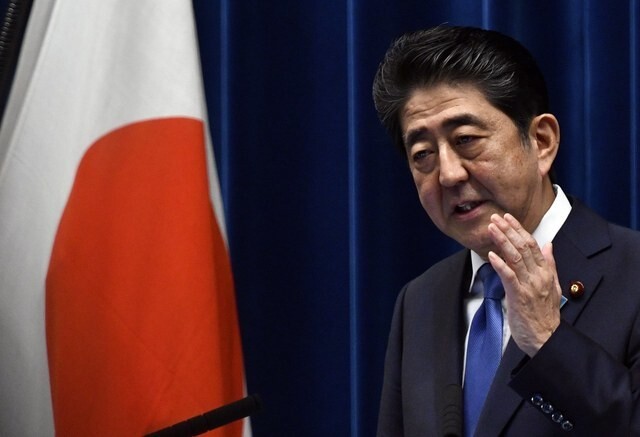hankyoreh
Links to other country sites 다른 나라 사이트 링크
Japan requests formation of arbitration committee for forced labor ruling

The Japanese government has asked the South Korean government to set up an arbitration committee to deal with a judicial decision awarding damages to Koreans who performed forced labor for Japanese companies during Japan’s colonial occupation of Korea.
“More than four months have passed since we requested [bilateral] deliberations based on our claims agreement on Jan. 9. Despite repeating this request several times, the South Korean government has declined to take part in the deliberations. In accordance with our agreement, we have notified South Korea that we are referring this matter to an arbitration committee,” Japan’s Ministry of Foreign Affairs said on May 20.
Since the South Korean Supreme Court sided with victims of forced labor in their lawsuit against Nippon Steel & Sumitomo Metal and Mitsubishi Heavy Industry at the end of last year, Japan has objected that the ruling violates an agreement it reached with South Korea in 1965 that dealt with outstanding claims.
The two countries’ agreement stipulates that, if a dispute arises in relation to the agreement, the two sides should first attempt to resolve that dispute through diplomatic channels; should that fail, the agreement authorizes them to refer the dispute to an arbitration committee. The agreement further states that, upon receiving a request for arbitration, the two countries are to appoint committee members within 30 days and then reach an agreement about nominating committee members from a third country within 30 more days.
As a consequence, the arbitration committee cannot be set up without the consent of the South Korean government. The apparent reason that Japan is nevertheless asking for the establishment of an arbitration committee is to pressure the South Korean government and to tilt international opinion in its favor.
The next steps that Japan can take are filing a petition against the South Korean government with the International Court of Justice (ICJ) and taking retaliatory measures. Just as with the establishment of the arbitration committee, no trial can be held at the ICJ without the consent of the South Korean government. Japan’s retaliatory measures could include suspending the supply of certain Japanese-manufactured parts to South Korea and restricting the issuance of Japanese visas to Korean nationals.
Japan is widely expected to move ahead with those measures when the asset sale requested by attorneys for the plaintiffs is completed and stock formerly belonging to Nippon Steel and Sumitomo Metal and by Nachi-Fujikoshi is liquidated.
Foreign Minister Taro Kono criticized the South Korean government while speaking before the Audit Committee in Japan’s House of Councillors on Monday. “[South Korean] Prime Minister Lee Nak-yeon said that his government is limited in the action it can take. It’s regrettable that a person in authority has made such a remark, since we’d been hoping the South Korean government would take action. [South Korea] has refused to take part in deliberations for more than four months now,” Kono said.
After Nam Gwan-pyo presented his credentials as South Korea’s new ambassador to Japan to Japanese Emperor Naruhito on Monday morning, he was summoned to the Ministry of Foreign Affairs by Vice-Minister Takeo Akiba and told that the South Korean government needs to agree to set up an arbitration committee.
By Cho Ki-weon, Tokyo correspondent
Please direct comments or questions to [english@hani.co.kr]

Editorial・opinion
![[Column] When ‘fairness’ means hate and violence [Column] When ‘fairness’ means hate and violence](https://flexible.img.hani.co.kr/flexible/normal/500/300/imgdb/original/2024/0516/7417158465908824.jpg) [Column] When ‘fairness’ means hate and violence
[Column] When ‘fairness’ means hate and violence![[Editorial] Yoon must stop abusing authority to shield himself from investigation [Editorial] Yoon must stop abusing authority to shield himself from investigation](https://flexible.img.hani.co.kr/flexible/normal/500/300/imgdb/original/2024/0516/4417158464854198.jpg) [Editorial] Yoon must stop abusing authority to shield himself from investigation
[Editorial] Yoon must stop abusing authority to shield himself from investigation- [Column] US troop withdrawal from Korea could be the Acheson Line all over
- [Column] How to win back readers who’ve turned to YouTube for news
- [Column] Welcome to the president’s pity party
- [Editorial] Korea must respond firmly to Japan’s attempt to usurp Line
- [Editorial] Transfers of prosecutors investigating Korea’s first lady send chilling message
- [Column] Will Seoul’s ties with Moscow really recover on their own?
- [Column] Samsung’s ‘lost decade’ and Lee Jae-yong’s mismatched chopsticks
- [Correspondent’s column] The real reason the US is worried about Chinese ‘overcapacity’
Most viewed articles
- 1China calls US tariffs ‘madness,’ warns of full-on trade conflict
- 2[Column] US troop withdrawal from Korea could be the Acheson Line all over
- 3[Editorial] Yoon must stop abusing authority to shield himself from investigation
- 4[Column] When ‘fairness’ means hate and violence
- 5[Column] How to win back readers who’ve turned to YouTube for news
- 6US has always pulled troops from Korea unilaterally — is Yoon prepared for it to happen again?
- 7[Book review] Who said Asians can’t make some good trouble?
- 8Naver’s union calls for action from government over possible Japanese buyout of Line
- 9Could Korea’s Naver lose control of Line to Japan?
- 10[Editorial] Korea must respond firmly to Japan’s attempt to usurp Line